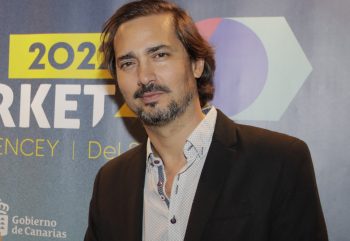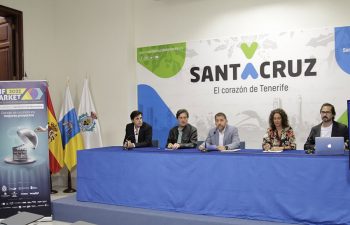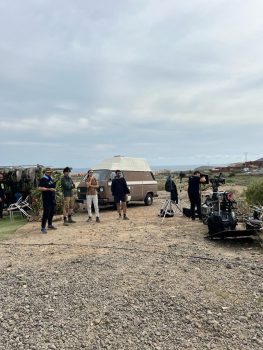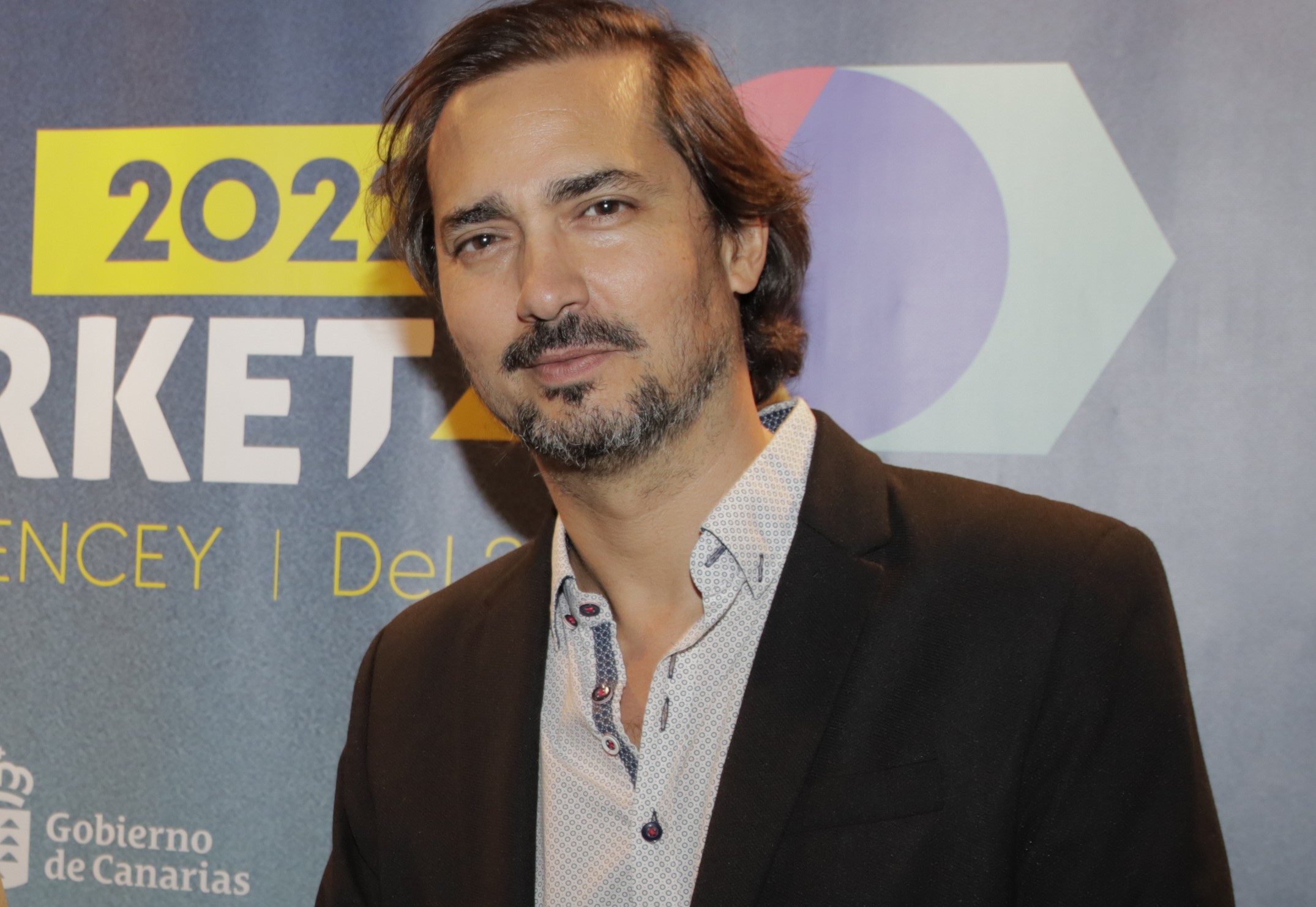EVENTS | CONTENTS | AUDIOVISUALS | BUSINESS
The event has innovated with ‘Laboratorio de Obras Literarias Canarias’, to contribute to literature and audiovisuals having a meeting place.

Guillermo Ríos
Guillermo Ríos, director of the CIIF Market 2022, responds in this interview to the director and editor of TVMAS, Amanda Ospina, about the turns, objectives and results of the event that has the Canary Islands as its epicenter and the focus on LATAM
“The Canary Islands have a fantastic climate, more than 3,000 hours of light per year and a variety of landscapes that are very close to each other, which offers great savings in production.”
For six days, authors, scriptwriters, filmmakers, production companies, television channels, distributors, sales agents, investors, and other professionals have gathered to promote the creation of cinema and television.
Talking about locations is like going to a dictionary to look for references. Such is our dynamic industry. Why is the Canary Islands a key destination to invest and go to produce?
The Canary Islands are a key destination for the audiovisual sector driven by a powerful investment tax deduction incentive of 45% to 50% and in some cases up to 54%, which has made the economy and industry grow in recent years. . The Canary Islands have excellent locations, a fantastic climate, more than 3,000 hours of light per year and a variety of landscapes that are very close to each other, which offers great savings in production.
The CIIF Market event was born to encourage European co-production. How and why did it become an international co-production market, with an emphasis on a continent like LATAM? Are there also interests in tourism, the business of events and/or expansion of other businesses that support investments in the audiovisual sector?
The market was born as ‘Euroforum’, within the ‘Las Palmas Film Festival’, aimed at European co-productions. When I started directing it, it became the ‘Canary Islands International Film Market’, to promote a greater alliance with Latin American countries, without forgetting the focus on Europe, of course, and to capture the international community. But we have opened a special connection to Latin America, where the Canary Islands feel a very powerful link for many reasons, the way of speaking, thinking and other historical links.
The film and audiovisual industry is an economic engine that generates activity and wealth and is a sector capable of establishing an identity of culture and growth in terms of job creation and investment interaction. CIIF Market seeks to contribute to its revitalization by attracting national and international companies and encouraging meetings with Canarian producers to promote the co-production of projects for a global market. For six days, authors, scriptwriters, filmmakers, production companies, television channels, distributors, sales agents, investors, and other professionals have gathered to promote the creation of cinema and television.
What are the results this year and the impulses for the audiovisual sector?
The event this year has come of age, it has been a meeting point between cinema and literature, between creation and production, between Canarian, national and international talent, and business management, bringing together more than a hundred professionals from the sector, as well as local writers and editors and radio and television news media, written and specialized press.
In this 18th edition, the first CIIF MARKET Lab – ‘Laboratorio de Obras Literarias Canarias’ has been launched as one of the great novelties of the market, so that literature and audiovisuals have a meeting place, in addition to highlighting the Canary talent connecting both sectors and promoting their international projection.
Around 400 individual meetings have been held between the delegates of the projects and the invited receiving companies, to explore new ways of financing and encourage co-productions, and in the case of literary works, analyze their possibilities of adaptation to different screens.
Important prizes have been awarded to projects and literary works with the aim of promoting the development and internationalization of film and audiovisual production and adaptations of Canarian literary works.
And as for our objective, it has been to grow in quality and not so much in quantity. We are a market that values proximity, it is our essence. The current size allows us to listen to each other better and have more time to analyze the projects, with a full schedule of meetings, but proximity is our greatest hallmark. Coordination with the different institutions and organizations that make the CIIF Market possible and that have always supported us is also essential, such as the Government of the Canary Islands, PROEXCA, the Cabildo de Tenerife and the Santa Cruz de Tenerife City Council.
Tell me about the projects and the value of the projects that have arisen from this event between the Canary Islands and LATAM and/or companies from other continents…
Among the advances and successes of the projects that have participated in recent market editions, we can highlight some of them, such as: “Pobre diablo” (Los Hermanos Polo, Japónica Films, Volcano International Productions and Batiak Films, Spain), “Road Trip Ibérica” that participated in CIIF Market 2019, where it was recognized with the Music Library & SFX Award for music synchronization and finalist for the CIIF Market Award for the project with the greatest international projection. Currently under the name of “Lo carga el diablo”, Guillermo Polo’s first film, it has recently finished filming in Tenerife, having previously passed through Valencia, Alicante, Soria, Teruel and Tenerife. It stars Pablo Molinero (La peste), Mero González (I leave it whenever I want, Valeria), Isak Férriz (Giants), Antonia San Juan (All about my mother, El hoyo) and Itziar Castro (Vis a vis).
“A vulgar and sad solitary”, by Gris Medio (Spain), directed by Efthymia Zymvragaki, now with the title “And Now the Light Falls Vertical”, is a project that participated in the 2021 edition and has had a extensive tour with numerous selections in different laboratories, residencies and international markets (Cannes Marché du Film Docs in Progress, Dok. Fest Munich Marketplace, Dok. Incubator in Prague, MIA in Rome, New Visions Market by Ji.hlava IFF). It recently had its release in the Competitive Envision section, with a nomination for Best First Feature, at the 35th edition of the prestigious IDFA Amsterdam International Documentary Film Festival.
Other examples of projects that are moving forward are “La mala madre”, by Mordisco Films (Spain), directed by Alicia Albares and selected in 2021, which was presented in May at Fantastic 7, the horror section of the Marché du Film de Cannes. and previously participated in Frontières de Canadá, one of the most important fantasy competitions in the world, in which it was the only Spanish project selected. Also “Me dicen el Panzer”, a Spanish-Panamanian co-production by Marco Toledo, from CIIF Market 2018, which began filming this year in Panama and recently in Tenerife.
Lastly, what are the concrete results of literary works that have been selected to turn them into audiovisual pieces in the first edition of CIIF Market Lab.?
A few years ago it was decided to bet on literary adaptations. There is a growing demand for content and there is a need for stories to tell, which is why they were invited to attend the CIIF and hold a meeting with the participants. For this edition, we realized that the literary sector should have a greater meeting point with the audiovisual industry, which is why the Laboratory of Canarian Literary Works was born.
Mentoring sessions, review of dossiers, preparation of exhaustive analysis of the compositions have been carried out to enhance their adaptation possibilities, in collaboration with the Adapta Market platform. An online pitch workshop has also been held, in which he was trained on how to present and sell his projects to the audiovisual industry.
The works of CIIF Market Lab were later presented in pitch sessions before delegates from the cinematographic and audiovisual sector, and they have held meetings with producers or scriptwriters interested in their works.
The reception of the Lab has been very good, and there are already conversations after the fact and interest in some of the works selected this year, in the first edition. We have managed to get them interested in these authors who may have difficult access to the audiovisual industry and have had the opportunity to establish synergies for the start of upcoming or future collaborations.



